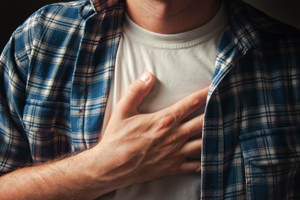 It might be a big Italian meal—meatballs, lasagna, red wine—or a serious encounter with stuffed jalapenos. Whatever your preference, if you suffer heartburn, you’re going to pay for it.
It might be a big Italian meal—meatballs, lasagna, red wine—or a serious encounter with stuffed jalapenos. Whatever your preference, if you suffer heartburn, you’re going to pay for it.
Every month, 40% of the population suffer heartburn. An unlucky 10% reach for the antacids or acid blockers daily.
Heartburn is a symptom of gastroesophageal reflux, the escape of acids from the stomach back into the esophagus. There is a burning sensation behind the breastbone, maybe a sour taste in the mouth. Mild-to-moderate heartburn is a nuisance, but with chronic reflux, stomach acid can irritate the lining of the esophagus, larynx, and throat. Recurring episodes of heartburn during sleep can even erode tooth enamel. Any hoarseness, persistent throat clearing, or difficulty swallowing merits medical attention.
Heading off heartburn at the pass
Acid blocker medications are commonly available over-the-counter, and meant to be taken before you sit down to a meal that means trouble. Antacids (such as Mylanta or Tums) are quicker and cheaper, but are taken after the fact, when heartburn is well under way.
So there are ways to neutralize acid and relieve heartburn, but current wisdom suggests that the best method is to preventing heartburn in the first place. Here’s how:
- Eat your largest meal in the middle of the day.
- Avoid all the foodstuffs you love: spicy or fried foods, citrus, tomatoes, onion, chocolate.
- Extra pounds increase abdominal pressure and push acid back from the stomach. Weight loss helps.
- Don’t lie down after you eat. Gravity is a fact.

